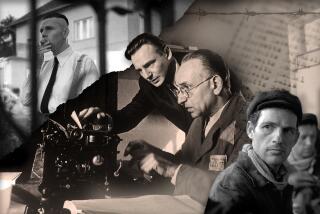MOVIE REVIEW : TRIAL’: A NEW SOVIET VIEW OF WAR
- Share via
World War II movies are the enduring staple of the Soviet film industry because they are so safe politically and because the Russians’ terrible ordeal at the hands of the Germans lends itself so easily to screen heroics. They are the Westerns of the Soviet cinema in which the good guys are the Russians and the bad guys are the Germans. The simplicity of this view informs the war pictures of such sophisticated directors as Elem Klimov and even the late Andrei Tarkovsky.
Alexei Gherman’s 1971 feature debut film “Trial on the Road” (at the Fox International), adapted from the novels of his father Yuri, is just as grueling as the countless Soviet war pictures that preceded it. However, it possesses a moral complexity so radical and challenging that it was banned for 15 years, released at last along with Gherman’s 1984 “My Friend Ivan Lapshin” (which played the Fox last month) as a result of Gorbachev’s glasnost policy.
Shot in an appropriately harsh black-and-white, “Trial on the Road” is indeed trying, so uncompromising in its somberness that it is almost unbearably depressing until its final half hour when it ignites. Yet for anyone seriously interested in the Soviet cinema it is worth submitting to because of the fresh, virtually unique perspective it brings to the Soviet Union’s wartime experience, which has clear implications for the present.
Like so many Soviet films, it’s hard to follow because of the inadequacy of the English subtitles and because its cast is largely unfamiliar. Yet in outline, it’s fairly simple. Overcome by despair, Lazarev (Vladimir Zamansky), a Red Army sergeant, has surrendered to the Nazis and become a member of their hated fascist police force. Regretting this move profoundly, he eventually allows himself to be captured by his own people, and is prepared to be hanged by them.
Senior Lt. Ivan Lokotkov (Roland Bykov), head of a Russian partisan detachment, has a different idea. A tough but wise and humane Everyman, Lokotkov believes that the tormented Lazarev is sincere in his repentance and desire for redemption. The lieutenant also needs a man who can prevent the Nazis from shipping vast quantities of food, so desperately needed by the Russians themselves, to Germany. Who better to lead the operation than Lazarev, well known and trusted by the Germans? But can Lazarev be trusted?
To American audiences, such a dramatic premise is not all that unusual, but you can see how earth-shaking it would be for Russians. The controversial character is really neither Lazarev, who craves to make a self-sacrificing gesture, nor Lokotkov, who is the common man at his noblest and earthiest, but a hard-line major (Anatoly Solonitzin) who views Lazarev as a traitor pure and simple. What’s genuinely daring about “Trial on the Road” is its critical view of the major.
For all its solid craftsmanship and strong performances, “Trial on the Road” (Times-rated: Mature) is undeniably plodding for its first two-thirds. But the moment of truth at which it finally arrives suggests the the Russians are ready for a more honest look at themselves on the screen.
‘TRIAL ON THE ROAD’
A Sovietexport film release of a Lenfilm Studioes production. Director Alexei Gherman. Screenplay Eduard Volodarsky; based on the novels of Yuri Gherman. Music Isaak Schwartz. Art director Valery Yurketvich. With Rolan Bykov, Vladimir Zamansky, Anatoly Solonitzin, Oleg Borisov, Anda Zaitzs. In Russian, with English subtitles.
Running time: 1 hour, 35 minutes.
Times-rated: Mature.
More to Read
Only good movies
Get the Indie Focus newsletter, Mark Olsen's weekly guide to the world of cinema.
You may occasionally receive promotional content from the Los Angeles Times.








